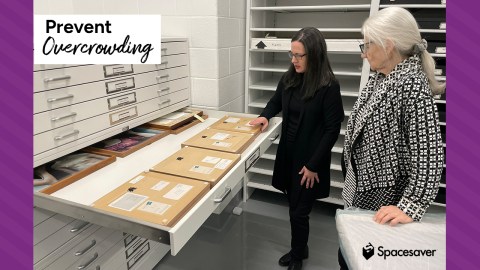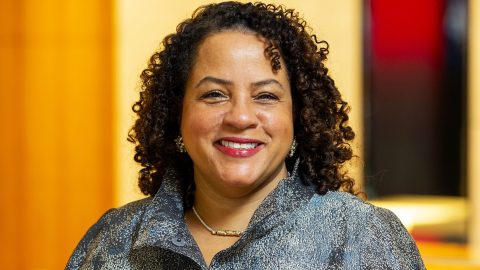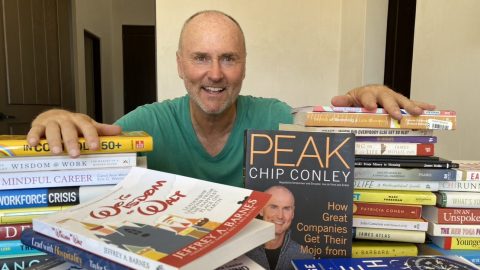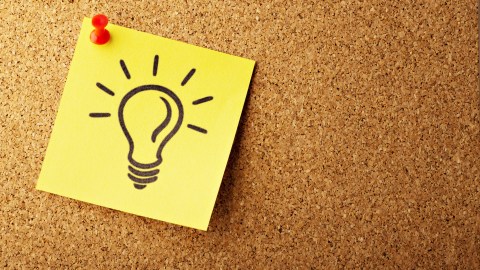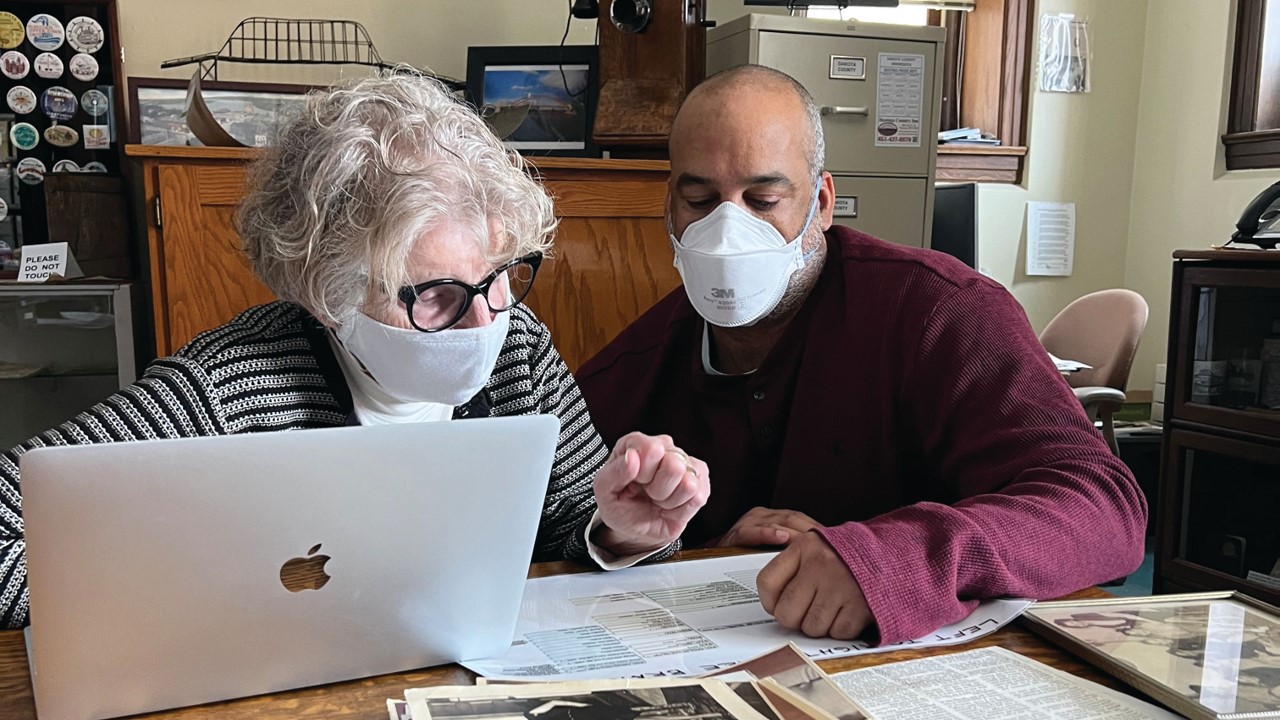
This article originally appeared in the September/October 2022 issue of Museum magazine, a benefit of AAM membership.
After Facing Change, four historical societies in the Twin Cities are working together to better engage the African American communities they serve.
Museums exist to serve community, and most museum leaders understand that this means their entire community. We are trying to create institutions where everyone interested in and impacted by a museum will be represented, welcomed, and engaged. In the wake of the murder of George Floyd, however, the enormous gap between this aspiration and reality was brought into sharp focus.
In 2020, the Ramsey County Historical Society’s (RCHS) connections in the African American community existed but were limited, and many of our colleagues across the state were either in a similar situation or had no network at all to help them understand the impact of Mr. Floyd’s killing. In a community forum hosted by the Minnesota Museum of American Art (the M) and sponsored by RCHS to address what role, if any, museums should be taking in the preservation and exhibition of the uprising art being created by local artists, the absence of trust between the Twin Cities’ African American community and its museums became incredibly clear.
As a field we had not invested the time to build trust or, worse, had exploited cultural groups and then let the relationships wither away when no longer “needed.” At the forum, community members explicitly named museums as part of the problem and said they did not trust us to preserve and provide access to this art. While the leadership teams at the M, RCHS, and several other museums were not surprised by this feedback, it was shocking to some museum staff and volunteers and hard to hear regardless. A community approach, with limited museum involvement, evolved that has partially addressed art preservation and access. There is still a role for museum expertise in these efforts, and I am hopeful that ultimately this will be an opportunity for us to do better—time will tell.
The idea of doing better spans the museum field and progress is happening, thanks in part to the Facing Change program, which sought to accelerate this conversation by improving the diversity of museum boards. When we learned that the Twin Cities was going to be one of the communities included in the first iteration of the program, I had a series of conversations with our board leadership. Diversification of our board was a strategic priority, and while we were making inroads in recruiting, we knew there was a lot of work to be done if RCHS was to evolve more quickly into the organization we aspired to be.
This program could help us, but it would require more time from our staff and board, which were already involved in large, transformative initiatives. Could we do it? We also wondered if we had done enough work to achieve buy-in from our entire board by the time the program started. Ultimately we decided the answer to both questions was yes, and we applied.
Our Facing Change Experience
By the time the program kicked off, RCHS had achieved a representation milestone, namely that seven people of color were serving on the board of directors, representing 25 percent of the board. As Facing Change moved through its first year, it was clear that the program was providing good foundational building blocks. Our board and staff learned a lot about what we did not know. Without Facing Change, we would have been hard pressed to absorb that information independently in the same amount of time.
We needed tools to better communicate about racism, a schedule to follow that kept us from wallowing in paralysis analysis, opportunities for individuals to build their cultural competencies, regular access to counselors who had gotten to know us, and the skills to identify systems and processes that were exclusionary, biased, or racist. All of these things were available in the program and continue to serve us well.
However, some of our team were concerned they would make mistakes and be labeled racists, and they moved through the start of the program cautiously. Missteps happened, and they will continue to happen. That is simply unavoidable, and anyone undertaking this work needs to accept that reality. However, nobody was labeled racist. That was essential. These were people whose intent was good and who wanted their time, labor, and resources to make the world better. They were able to engage in the work and learn, and positive change is happening as a result.
Not everything went smoothly the first year of the program: there were some communication issues that were later resolved, and the pacing was too slow for some of the organizations that were further along. The program leadership adapted to ensure each organization could get from the program what it needed while still helping build what I think is the most important legacy of Facing Change: establishing connections and a community of action among the participating museums.
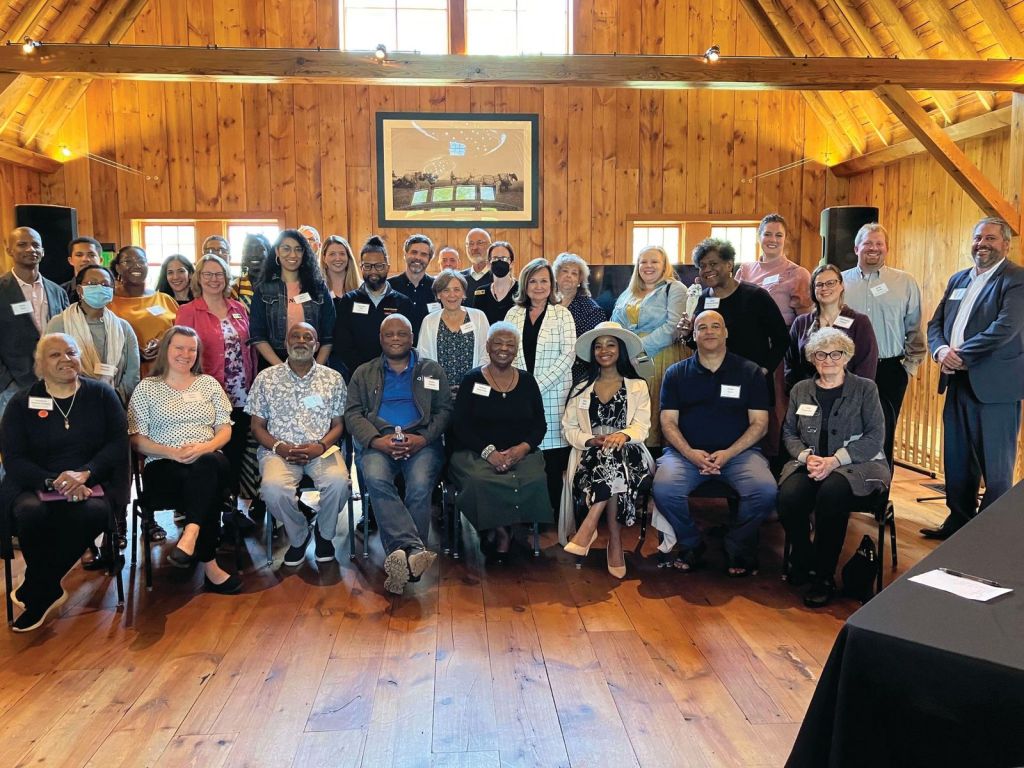
Arthur C. McWatt Fellowship Program
In the second year of the Facing Change program, RHCS joined with Anoka County Historical Society and Hennepin History Museum—also Facing Change participants—and Dakota County Historical Society to establish a new partnership to accelerate our engagement of the African American communities we serve. With some guidance from the community, the Arthur C. McWatt Fellowship program was born.
The program built on a similar idea that had died from lack of funding interest eight years ago. This time it took about a year to secure the funding to create a pilot program focused on helping each partner organization engage the African American communities they serve, advance various history projects (either identified by the McWatt Fellows or selected from a menu of options at each partner museum), and identify a network of individuals and organizations engaged in preserving and presenting Black history in Minnesota.
After an exploratory conversation with Jeremiah Ellis, an author and board prospect, about the scope of the project, he followed up with a proposal in which he suggested naming the program after the late Arthur C. McWatt. McWatt was a social studies teacher at Central High School in St. Paul, an author, and a former member of the RCHS Editorial Board who had written for RCHS on several occasions. A civil rights activist himself, he was married to the renowned local civil rights leader Katie McWatt.
We initially planned to employ four fellows (one per location) working a combined 60 hours a week over about nine months (one at 30 hours/week; three at 10 hours/week). One of the roles would be eligible for health insurance, all would be employees instead of contractors, and the rate of pay would range from $20–$25 per hour. We expected applicants to primarily be early career folks and people working in the museum gig economy. The Fellows would facilitate weekly meetings between African American historians, community leaders, or organizations and the leadership at each partner museum.
As we prepared to roll the program out, COVID-19 persisted, inflation was becoming an issue, and other initiatives at RCHS took time away from the launch. By the time we launched the program at the beginning of 2022 we had increased the wage range to $25–$30/hour, heavily promoted the flexible nature of the work, and knew we could hire more than four people because we were working with a 19-week timeline instead of 40.
We hired seven Fellows, who averaged about 25 hours per week, and five were mid- to late-career individuals with important projects in mind or in the works. Fellows included the founder of the African American Registry, the founder of Memorialize the Movement (memorializethemovement.com), and one of the founders of the St. Paul Black Lives Matter chapter. The Fellows’ projects were impressive and included “If not now, when?” which focused on connecting youth with elders in the community; the second annual “Justice for George: Our Strength, Our Story” event, which included an art exhibition with painted plywood murals, performances, and speakers from across the Twin Cities area; and “Building Remembrance for Reconciliation” (BR4R), an ongoing effort to use history and the arts to remember, reconcile, and heal from generations of racism through ongoing community discussions, web-based information, and future exhibitions.
When we launched the fellowship, there were people in the community who knew us and loved the idea, folks who didn’t know us and had serious concerns and doubts (even opposition in one case), and people who knew and loved us but were cautious about this endeavor because it involved four white-led organizations. These were all reactions we expected.
We also recognized that we did NOT have the networks necessary to be trusted by the community at large, and we didn’t know how those networks would manifest. We learned later that some folks chose not to apply due to that lack of trust, and others applied to see if we were for real. The fellowship program is helping us build the relationships needed to serve all parts of our community, but it is a process that will take time.
In terms of structure, we provided museum memberships and research subscriptions for each Fellow, computers and technology stipends, expense reimbursement, and funds to pay for their time with members of the community. Fellows met regularly with partner museums and as a cohort. We paid for fellows to attend the Minnesota Alliance of Local History Museums conference, arranged meetings with community leaders, and helped fund a Kinara (community gathering) of folks committed to preserving and presenting Black history in southeastern Minnesota.
The first iteration of the McWatt fellowship program ended on June 30, 2022, culminating with presentations by each Fellow on their project and an assessment of how to make future iterations of the program better. We have already applied for a second round of funding with the same partner institutions.
The Work Continues
RCHS is committed to continuing our DEAI journey, including recruiting diverse individuals to serve on our board, committees, and staff. We will continue to amplify stories that had previously been ignored or erased in our publications and exhibits. We are also committed to maintaining the community of action created via Facing Change, a community that represents the real, lasting legacy of the program.
The Bell Museum of Natural History and RCHS hosted a gathering of Facing Change alums in the spring of 2022, and two others in our cohort will host the next one. At these gatherings we share experiences, problem solve, and maintain the momentum we have built over the past several years. The work of the entire cohort is essential for lasting change in our community, and the cohort needs to grow to include museums that could not participate in the first iteration.
There is real momentum at each of our individual museums, and by continuing our work individually and together we just may create that better world where everyone feels welcomed, engaged, and represented.

Left to right: Amira Mclendon, Semhar Solomon, Arthur C. McWatt Fellow Leesa Kelly, Hannah Yee, and Dani FolletDion.
Thoughts on DEAI Partnerships
The Arthur C. McWatt Fellowship program is a collaboration between Ramsey County Historical Society, Anoka County Historical Society, Hennepin History Museum, and Dakota County Historical Society. We had previously worked together on different projects, so there was shared trust in our intent and abilities at the outset. However, working together on diversity, equity, accessibility, and inclusion (DEAI) projects created unique challenges. Following are some of the lessons we have learned.
Leave more time than you think you need for community input, even if you have community relationships in place. Each partners’ network of advisors may get feedback that contradicts that received by another partner. Take the time necessary to understand those differences, acknowledge them, and determine your path forward.
Remind yourself and your team that no community is a monolith of thought. We have been praised by one segment of a community for our work and chastised for it by another. Those moments can be unsettling and discouraging.
Accept that you will make mistakes and that you will learn from them. Share these mistakes with your partners—no need for everyone to make the same ones.
Plan your meetings and calls with partners well in advance and make those times sacred. This important work is challenging and must be well aligned.
Senior leadership must be directly involved in this work. While meeting the needs of the communities your institution serves is a great opportunity to involve your larger team, senior leaders must be visible in the work for it to be credible. Carving out time to attend additional community events is a big challenge for leaders in this work.
Acknowledgements
Special thanks to the extraordinary folks on the RCHS board and staff traveling this path together; the exceptional leaders of our partner museums: Rebecca Ebnet-Desens, John Crippen, Acoma Gaither, and Matthew Carter; and the Arthur C. McWatt Fellows who have made transformational impacts on all of us: Jeremiah Ellis, Ben Mchie, Adem Ojulu, Greg McMoore, James Curry, and Chauntyll Allen. Finally, I am grateful for Levon Williams, whose wise counsel has made me a better leader, and the American Alliance for supporting a better, more inclusive community of members.




